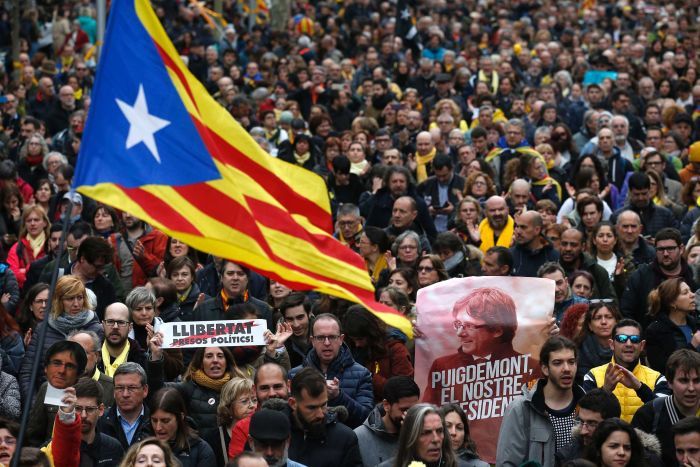26.03.2018 - 11:08
Mr Puigdemont faces up to 25 years in prison in Spain for organising an illegal referendum on secession last year.
He had entered Germany from Denmark after leaving Finland on Friday when it appeared police would arrest him there and begin an extradition process requested by Spain.
The detention threatens to worsen the Catalan crisis which flared last year when the region made a symbolic declaration of independence, prompting Madrid to take direct rule.
German police said they had arrested Mr Puigdemont in the northern state of Schleswig-Holstein on a European arrest warrant issued by Spain.
Police did not say exactly where Mr Puigdemont, who had been living in Brussels since late October, was being held but Spanish press said he was at a police station in the nearby town of Schuby.
German magazine Focus said Spanish intelligence informed the BKA federal police that Mr Puigdemont was on his way from Finland to Germany. It gave no source for its report.
Police use force against protestors
In Barcelona, police dressed in riot gear struck demonstrators with batons as they tried to push back a large crowd attempting to advance on the office of the Spanish government’s representative in Catalonia.
Catalan police have blocked the street and issued a call for people not to gather.
Thousands answered the call by a pro-independence grassroots group to protest in the city centre hours after Mr Puigdemont was detained by German police.
Spain’s Supreme Court ruled on Friday that 25 Catalan leaders would be tried for rebellion, embezzlement or disobeying the state.
Supreme Court judge Pablo Llarena also sent five separatist leaders to pre-trial jail. Their detention sparked protests across Catalonia.
German court appeal possible
It is not clear if Mr Puigdemont will be immediately extradited from Germany.
Mr Puigdemont had previously made clear his preference to fight the extradition process from Belgium, where the former Catalan leader was heading at the time of his detention, according to Mr Puigdemont’s spokesman, Joan Maria Pique.
“The president was going to Belgium to put himself, as always, at the disposal of Belgian justice,” Mr Pique said.
The Spanish prosecutor’s office said on Sunday it was working closely with counterparts in Germany and EU agency Eurojust to provide all of the information needed to make the European arrest warrant for Mr Puigdemont effective.
The European arrest warrant system in place since 2004 makes it easier for EU countries to demand the extradition from other EU states of people wanted for crimes, and removes political decision-making from the process.
EU countries issue thousands of such warrants each year.
Mr Puidgemont could take his case to Germany’s highest court, which had in 2005 blocked the extradition to Spain on an EU arrest warrant of a German-Syrian al-Qaeda suspect.
The case of Mamoun Darkazanli sparked a judicial row between the two countries after Germany’s Federal Constitutional court refused to turn over Mr Darkazanli, saying that EU extradition laws designed to speed up the delivery of suspects between member states violated the rights of German citizens.
The Spanish Supreme Court had issued an international arrest warrant against Mr Puigdemont last year but withdrew it in December to avoid the risk of Belgian authorities granting him asylum.
Leaving Belgium had exposed him again to the risk of arrest.
Reuters/AP
More at ABCnews Melbourne



